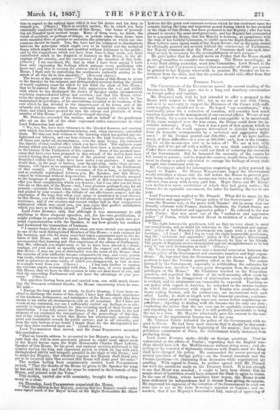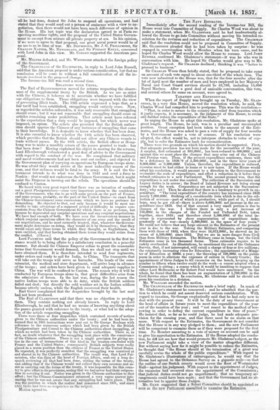FOREIGN POLICY.
The CHANCELLOR of the EXCHEQUER moved the second reading of the Income-tax Bill. This gave rise to a long and desultory conversation on foreign policy and taxation. Mr. Manama said, that he had intended to offer a proposal to the House with respect to this bill ; but as we are at war with China, and as it is necessary to support the Ministers of the Crown with sufficient supplies, he should not do so. He hoped "our constitueuts," who continually press for a reduction of taxation, will consider how much taxation depends on the management of our external affairs. We are at war with Persia, for a cause too shameful and contemptible to be mentioned. If the cause assigned were the true cause, the House could draw the inevitable inference ; if not, "then it was a part of that systeni which in every quarter of the world appears determined to distract this country from its domestic arrangements by a turbulent and aggressive diplomacy," If the Persian quarrel cost 500,000/., and if we have half-adozen of these difficulties in a year at 500,0001. each how is the remainbig id. of the income-tax ever to be taken off? We are at war with China, and if we get off with a million, we may think ourselves lucky. Under these circumstances, he could not think of reducing the resourees of the Government. But he lamented the necessity of the comae he felt bound to pursue ; and he hoped the country would force the Coveniment to change a policy calculated to outrage the feelings of every etute brought into connexion with us. Mr. COCHRANE asked for information respecting the policy pursued in regard to Naples. Sir lImeue WILIAM:01(13Y hoped the Government would introduce a clause into the bill before the House to prevent persons being called on to pay the income-tax twice in cases where the legal collector runs away with money paid him. Major REED and Mr. IliteuLA31 declined to move resolutions of which they land given notice ; the former for an equitable assessment, the latter for limiting the tax to one year. Lord PALMERSTON replied to Mr. Disraeli. What aid he mean by the "turbulent and aggressive" foreign policy of the Government ? Did he mean the Russian war, or the peace with Russia ? did he mean that our friendly relations with France, Austria, Sardinia, the United States, are instances of a turbulent and aggressive policy ? He referred to the war with Persia : that war arose out of the turbulent and aggressive policy" of Persia, which invaded Herat in violation of a distinct engagement. "The right honourable gentleman told us illative were about to meet our constituents, and no doubt his reference to the turbulent and aggressive' policy of her Majesty's Government was made with a view to the hustings. (4 laugh.) But I beg to warn the right honourable gentleman, that the 'turbulent and aggressive' policy of her Majesty's Government will not be a convenient or successful election-cry for him or his friend.. The people of England are too elearsighted and too straightforward to be led away by any such declamation as that." (Cheers.) Mr. GLADSTONE thought there was a material connexion between the foreign policy of the Government and excessive taxation and high expenditure. Ho regretted that the Government had not shown a greater disposition to have the Persian question sifted in the House. The course pursued by the Government, especially in withholding the estimates for the Persian war, involves "a very great derogation from the rights and privileges of the House." Mr. Gladstone touched on the Neapolitan question, and regretted the failure of the well-meaning effort made by Government ; but he disapproved of intervention except where the end, is evident, and its attainment can reasonably be expected. Touching on our policy with regard to America, he remarked on the unwise manner in which the controversy with regard to Ruatan was conducted—the treaty ceding Ruatan, and the controversy, are inconsistent with each other. Lastly, he dealt at length with the financial question; condemning the course adopted of voting ways and means before considering expenditure; objecting to dealing with the Income-tax for only one year ; combating the notion that the tax ever can be equitably reconstructed ; and repeating his conviction that it is still perfectly practicable to bring the tax to a close. Mr. Mettles reluctantly gave his consent to the continuance of the inquisitorial Income-tax for one ',ear.
Mr. VERNON Sum defended the policy of the Government with re
garcl to Persia. He had been most anxious that it should be discussed : the papers were prepared at the beginning of the session ; but when negotiations commenced at Paris, the Government wisely abstained from producing them. Lord J mix RUSSELL spoke, chiefly on foreign questions. First he commented on the affairs of Naples ; regretting that the English war-. ships should have left the Mediterranean without doing more; and obe jecting to the renewal of diplomatic relations with Naples until the King shall have changed his policy. He commended the course pursued OA several questions of foreign policy—on the Central American and the Persian questiou--in abstaining from discussion while negotiations are pending. With regard to Persia' he neither agreed with Mr. Disraeli nor with the assertions made on the Treasury.bench. It is not enough, to say that Herat was assailed ; it ought to have been shown that ne means short of hostilities would have induced the Shah to agree to terms. In the ease of China, where hostilities have begun, the House wouldhave abdicated its independence had it shrunk from giving its opinion. lie expressed his approval of the intention of the Government to send out some one to act as Sir John Bewring's superior at Canton ; and re marked, that if her Majesty's Government had, instead of approving of -all he had done, desired Sir John to suspend all operations, and had stated that they would send out a person of eminence with a view to negotiation, then there would not have been much difference of opinion in the House. His last topic was the declaration agreed to at Paris respecting maritime rights, and the proposal of the United States Governanent to exempt from seizure all private property at sea. In his opinion, if we were to agree to that proposal, our great naval power would be of no use to us in time of war. Mr. DRUEIMOND, Mr. J. G. Pm:Limon; Sir CHARLES NAPIER, Mr. NEWDEGATE, and Sir FITZROY KELLY, COIICUrred with Lord John in this view. Mr. COBDEN supported the American proposal.
Mr. Minres defended, and Mr. WHITESIDE attacked the foreign policy of the Government.
The CHANCELLOR of the EXCHEQUER, in reply to Lord John Russell, said that the American proposal is under serious consideration, but that no conclusion will be come to without a full consideration of all the interests involved in the proposed change.
The Income-tax Bill was read a second time.



































 Previous page
Previous page